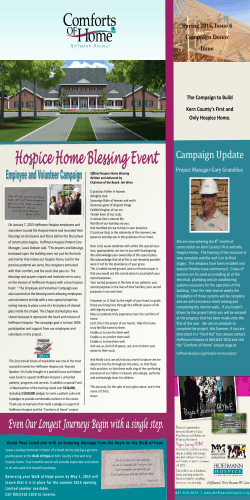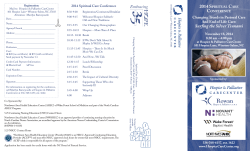
Pharmacotherapy for Heart Failure Patients at the End of Life:
Pharmacotherapy for Heart Failure Patients at the End of Life: A Retrospective Analysis of a National Cohort of Advanced Heart Failure Patients ß Introduction > Heart failure (HF) patients are one of the fastest- Kevin T. Bain, PharmD, BCPS, CGP, FASCP*, Terri L. Maxwell, PhD, APRN, BC-PCM*, Hillary S. Magee, BS*, David J. Whellan, MD, MHS, FACC† *excelleRx, Inc., an Omnicare Company, Philadelphia, PA • †Jefferson Medical College, Philadelphia, PA Discharge Status of Heart Failure Patients Enrolled in Hospice (n = 12,381) growing populations in hospice. Results > Medications such as angiotensin-converting 100% > Of the 12,381 patients included, 20.0% were enzyme (ACE) inhibitors, angiotensin II receptor discharged alive. 80% blockers (ARBs), and ß-blockers have been shown to > The median (lower-upper quartile) length of hospice improve survival and quality of life in mild, moderate, 60% and severe HF, yet little is known about the medica- stay was 17 (5 – 62) days. 9,899 tions that HF patients receive in hospice or the effect > Loop diuretics were the most frequently prescribed 40% these therapies have on outcomes. cardiovascular drug therapy (70.7%). 20% Objectives 2,482 > Describe the length of stay and discharge status of 0% Expired > Forty-two percent of patients were prescribed a ß-blocker, 34.6% an ACE inhibitor or ARB, and 29.0% Discharged Alive hospice patients with advanced HF. digoxin. > Describe HF patients’ pharmacotherapy profile at Cardiac Medications Prescribed for Heart Failure Hospice Patients the end of life, including medications that should generally be avoided in this population. n = 8,753 n = 5,229 Methods n = 4,288 n = 3,588 > Secondary (descriptive) analysis of a national n = 1,901 n = 1,882 pharmacy database (Hospice Pharmacia). Aldosterone antagonist CCB Antiplatelet Beta blocker Conclusion & Implications Digoxin Anticoagaulant > A substantial proportion of HF patients are discharged Thiazide diuretic Loop diuretic alive from hospice. > ACE inhibitors, ARBs and ß-blockers are suboptimally ACEI = Angiotensin converting enzyme inhibitor n = 1,368 admission and during hospice stay. ACE inhibitor or ARB n = number of patients n = 1,556 ARB = Angiotensin II receptor blocker n = 1,024 0% CCB = Calcium channel blocker 10% 20% 30% 40% 50% 60% 70% 80% Potentially Dangerous Medications* Prescribed for Hospice Patients with Heart Failure alive from hospice between 1/1/04 and 6/30/05, 2.5% 2.0% 1.5% 2.7% NSAIDs (n = 5,213) 15.5% 42.1% TCAs (n = 328) Alpha-adrenergic blocking agents (n = 243) > Proportion of patients prescribed an ACE inhibitor, Corticosteroids (n = 1,923) an ARB, or a ß-blocker. TZDs (n = 307) tions that may have deleterious effects in HF. prescribed. > More research is needed to better understand patient- > Length of stay and discharge status. > Proportion of patients prescribed select medica- non-hospice HF patients. advanced HF patients, such as NSAIDs, are commonly > Sample included patients deceased or discharged Main Outcomes utilized in hospice HF patients compared to studies of > Medications that may cause or exacerbate symptoms in Sample irrespective of initial enrollment date. non-steroidal anti-inflammatory drug (NSAID). Antiarrhythmic n = 1,899 cohort of advanced HF patients from a hospice > Patients’ medication profiles were queried on > Forty-two percent of patients were prescribed a NSAIDs = Non-steroidal anti-inflammatory drugs, TCAs = Tricyclic antidepressants, TZDs = Thiazolidinediones. *This list is not exhaustive; however, these medications may exacerbate HF symptoms (e.g., NSAIDs causing edema), may Metformin (n = 190) be contraindicated in advanced HF because of heightened adverse effects (e.g., fluid retention with TZDs), or may lead to cardiac abnormalities such as conduction problems or valvular defects (e.g., proarrhythmic potential of TCAs). Adapted from: Amabile CM, Spencer AP. Arch Intern Med 2004;164:709-20. n = number of patients level factors and outcomes associated with the provision of pharmacotherapy for HF patients in hospice.
© Copyright 2026





















